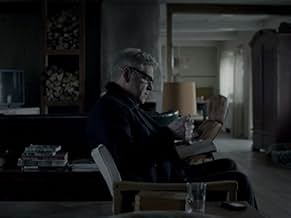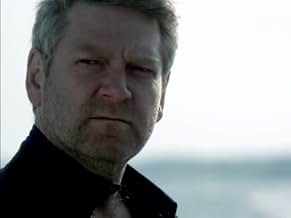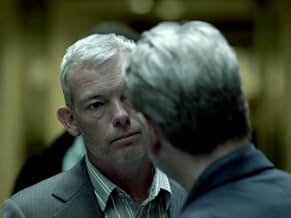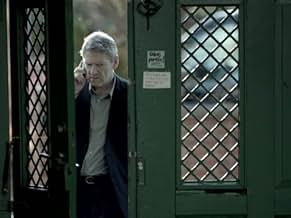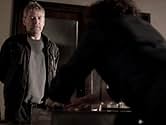Eine Fernsehsendung über einen seelensuchenden schwedischen Polizisten.Eine Fernsehsendung über einen seelensuchenden schwedischen Polizisten.Eine Fernsehsendung über einen seelensuchenden schwedischen Polizisten.
- Für 2 Primetime Emmys nominiert
- 12 Gewinne & 31 Nominierungen insgesamt
Folgen durchsuchen
Empfohlene Bewertungen
Watching two episodes of "Wallander" makes me think of Isabelle Huppert's line in Hal Hartley's great "Amateur": "everything I write comes out sad. Why do you think that is?" Kenneth Brannagh's shambling, weary detective Kurt Wallander is as far from TV's 'Columbo' as it's possible to get, despite certain physical similarities.
In a way that I seem to recognise as uniquely Nordic, Wallander goes about his daily business – solving murders – with a residual sadness on him and his world, and everything in the show – from the art-house photography and pared-down sets, to the score, to his life and to each episode's stories themselves – helps create a consistent portrait, so that by the time I settled down for episode two, Wallander's appearance was an automatic trigger to a certain state of mind.
Each classy episode takes its time, draws visual comparisons, sets Wallander up in his world, makes you know him better. I'm loving it : it's on a par with the excellent French TV thriller "Engrenages" that previously appeared on BBC4, and anything ever so slightly formulaic about the story lines in each episode is offset by the serious and committed acting, the well-drawn characterisation, the consistent visual tone. I'm so glad they avoided the Meryl Streep world of accents and wholesale removal of the drama to the UK (or USA). These are Swedish characters in a Swedish town who write in Swedish – it's just that we're hearing them in English. And this technique allows them to cast truly excellent English supporting actors without any fear of uneven accents or geographic transitions that don't work so well. (No English forest ever looks quite like a Scandinavian one. And the British don't so much do sadness and mournful humour, as bleakness and black humour – they're quite different.)
I saw Kenneth Brannagh as an electrifying 'Hamlet' on stage in the late 80s, and this feels something like being reacquainted with an old ghost. He's no longer young, and he's not beautiful, but he makes masterful use of his eyes, his voice, the very weariness life has given him – to create a memorable man, not just a cartoon portrait. Highly recommended.
In a way that I seem to recognise as uniquely Nordic, Wallander goes about his daily business – solving murders – with a residual sadness on him and his world, and everything in the show – from the art-house photography and pared-down sets, to the score, to his life and to each episode's stories themselves – helps create a consistent portrait, so that by the time I settled down for episode two, Wallander's appearance was an automatic trigger to a certain state of mind.
Each classy episode takes its time, draws visual comparisons, sets Wallander up in his world, makes you know him better. I'm loving it : it's on a par with the excellent French TV thriller "Engrenages" that previously appeared on BBC4, and anything ever so slightly formulaic about the story lines in each episode is offset by the serious and committed acting, the well-drawn characterisation, the consistent visual tone. I'm so glad they avoided the Meryl Streep world of accents and wholesale removal of the drama to the UK (or USA). These are Swedish characters in a Swedish town who write in Swedish – it's just that we're hearing them in English. And this technique allows them to cast truly excellent English supporting actors without any fear of uneven accents or geographic transitions that don't work so well. (No English forest ever looks quite like a Scandinavian one. And the British don't so much do sadness and mournful humour, as bleakness and black humour – they're quite different.)
I saw Kenneth Brannagh as an electrifying 'Hamlet' on stage in the late 80s, and this feels something like being reacquainted with an old ghost. He's no longer young, and he's not beautiful, but he makes masterful use of his eyes, his voice, the very weariness life has given him – to create a memorable man, not just a cartoon portrait. Highly recommended.
This new addition to the TV detective genre grabbed my attention and I was rewarded by an enjoyable drama. I was impressed by the scenery, Nordic interiors and ambiance of this piece, and it had an atmosphere of Northern light that reminded me of other detective stories set in the north, such as Insomnia (Al Pacino, in Alaska) or Smilla's Feeling for Snow. That atmosphere was compelling and Ken Branagh's performance kept my attention, although the plot seemed to be heading in a certain direction and the answer was not a big surprise. The fact that everyone spoke English but all were clearly Swedish was amusing as well. That aspect reminded me of Gorky Park, in which all the Russians spoke with English accents. It allows the suspension of disbelief and the English-speaking viewer feels drawn into another culture. I don't usually watch detective/murder mysteries these days because I don't enjoy murder as a spectator sport, but this was worth seeing because of the performances and the unusual setting, sets, high production values and stunning photography. Looking forward to the next 2 episodes.
While it does have its slow moments, and one or two plots may have moments that are hard to keep up. Regardless of how inferior it is or not to the 2005 series which is admittedly absolutely brilliant, this is still extremely good and any other flaws if any are compensated by the quality of how the series is made, constructed and acted. For instance, the Swedish setting is truly evocative and very often stunning. The music is haunting too, while the writing is of really good quality and the stories in general very well written. And then we have Kenneth Branagh, who I think is a great actor and more than decent director, especially in Shakespeare. He is brilliant as the dour and world-weary Kurt Wallander, and Sarah Smart, Jeany Spark, Rixhard McCabe and David Warner solidly support him. Overall, this is a well done television series. 9/10 Bethany Cox
Both the first series of Swedish TV's Wallander and the second collection of British TV's interpretations have recently been aired on British TV, and whilstthey share a number of elements and qualities (locations, excellent filmatography, thoughtful and impressive 'takes' on the central figure of Kurt Wallander), it's the differences that seem to separate a good television drama from an outstanding one.
Obviously the two productions differ in a number of basic ways and it's worth highlighting these as a given. For the most part Swedish Wallander uses Mankel's stories as inspiration, creating unique plots per episode, whilst British Wallander uses the source material and thus far has for the most part faithfully adapted 6 of Mankel's books (interestingly the choice has been to adapt out of sequence, although the original stories were also published out of sequence, in Britian at least). An exception is the depiction of Kurt's father and his struggle with dementia, which logically has to progress through the overall TV series.
A second key difference is the interpretation of Kurt Wallander's relationship with his daughter. Swedish TV puts Linda into the police force from the outset, and uses this device to explore their legendary troubled relationship with the added frisson of professional, hierarchical tensions. Also into the mix is the relationship between Linda and her colleague Stefan Lindman. British Wallander maintains the original Linda/Kurt story arc, with Linda not yet having enrolled for police duty.
A third difference is the inclusion/exclusion of the Ann-Britt Höglund character. It seems the Swedish version quickly came to view this character as unnecessary within the looser story structure, as she is dispensed with well before Series One concludes. For British TV Höglund remains integral, just as she is in the books.
However, setting aside these givens, there are a number of factors which set the two interpretations apart in terms of quality, success and viewer experience. British Wallander is quite pacey, moving the story along briskly from scene to scene. Whilst this mostly works, it does occasionally occur at the expense of scene and/or character development - the camera (and therefore the viewer) is forced to follow Kurt, leaving other characters as cyphers. This is most notable during scenes with colleagues at police HQ. Swedish Wallander adopts a slower style, allowing characters and stories to develop and unfold with greater subtlety. This approach leads to a second and quite fundamental difference, and it is this element that underlines the superiority of the Swedish Wallander. The combination of writing, direction and editing for a slower pace allows the Swedish actors to effectively 'do less' and achieve more. Accordingly, Henricksson, Bergman, Sällström, Rapace et al are repeatedly given the time and direction to use economy and skill to enable the viewer to understand what they are thinking, feeling etc. The final episode of Series One was a particular example of this, with all concerned but particularly Sällström and Henricksson underplaying beautifully to create scenes of desperate sadness, bewilderment and loss whilst actually 'doing' very little. In comparison, a combination of misjudged casting and actors being let down by script and scene construction in the British version means for the most part the viewer receives less reward. Branagh, Warner and most notably McCabe as Nyberg are the exceptions, the former not least because Wallander remains the prime focus through the British drama, and is therefore given more time, scene-by-scene, and Warner because he is quite simply an experienced and clever film actor. Yet it is McCabe who shines, underplaying beautifully, especially during scenes in Episode 4 - The Faceless Killers.
Views on casting are always contentious. Suffice to say, the Swedish series has somehow managed to secure a host of clever actors who know a thing or two about camera work, and particularly scenes in close-up. From the moments of occasional humour gratefully received from Mörck's Ebba and Gunnarsson's Svartman (an incidental and unsung masterpiece of a performance) to the brilliance of Henricksson and Sällström, it's the Swedish production which holds the treats and subtleties and warrants repeat viewings.
The British Wallander is indeed watchable, but let's hope the BBC transmits Series 2 of the Swedish production as soon as possible, and let's also hope the absence of Rapace and Sällström doesn't diminish what has been an excellent television production.
Obviously the two productions differ in a number of basic ways and it's worth highlighting these as a given. For the most part Swedish Wallander uses Mankel's stories as inspiration, creating unique plots per episode, whilst British Wallander uses the source material and thus far has for the most part faithfully adapted 6 of Mankel's books (interestingly the choice has been to adapt out of sequence, although the original stories were also published out of sequence, in Britian at least). An exception is the depiction of Kurt's father and his struggle with dementia, which logically has to progress through the overall TV series.
A second key difference is the interpretation of Kurt Wallander's relationship with his daughter. Swedish TV puts Linda into the police force from the outset, and uses this device to explore their legendary troubled relationship with the added frisson of professional, hierarchical tensions. Also into the mix is the relationship between Linda and her colleague Stefan Lindman. British Wallander maintains the original Linda/Kurt story arc, with Linda not yet having enrolled for police duty.
A third difference is the inclusion/exclusion of the Ann-Britt Höglund character. It seems the Swedish version quickly came to view this character as unnecessary within the looser story structure, as she is dispensed with well before Series One concludes. For British TV Höglund remains integral, just as she is in the books.
However, setting aside these givens, there are a number of factors which set the two interpretations apart in terms of quality, success and viewer experience. British Wallander is quite pacey, moving the story along briskly from scene to scene. Whilst this mostly works, it does occasionally occur at the expense of scene and/or character development - the camera (and therefore the viewer) is forced to follow Kurt, leaving other characters as cyphers. This is most notable during scenes with colleagues at police HQ. Swedish Wallander adopts a slower style, allowing characters and stories to develop and unfold with greater subtlety. This approach leads to a second and quite fundamental difference, and it is this element that underlines the superiority of the Swedish Wallander. The combination of writing, direction and editing for a slower pace allows the Swedish actors to effectively 'do less' and achieve more. Accordingly, Henricksson, Bergman, Sällström, Rapace et al are repeatedly given the time and direction to use economy and skill to enable the viewer to understand what they are thinking, feeling etc. The final episode of Series One was a particular example of this, with all concerned but particularly Sällström and Henricksson underplaying beautifully to create scenes of desperate sadness, bewilderment and loss whilst actually 'doing' very little. In comparison, a combination of misjudged casting and actors being let down by script and scene construction in the British version means for the most part the viewer receives less reward. Branagh, Warner and most notably McCabe as Nyberg are the exceptions, the former not least because Wallander remains the prime focus through the British drama, and is therefore given more time, scene-by-scene, and Warner because he is quite simply an experienced and clever film actor. Yet it is McCabe who shines, underplaying beautifully, especially during scenes in Episode 4 - The Faceless Killers.
Views on casting are always contentious. Suffice to say, the Swedish series has somehow managed to secure a host of clever actors who know a thing or two about camera work, and particularly scenes in close-up. From the moments of occasional humour gratefully received from Mörck's Ebba and Gunnarsson's Svartman (an incidental and unsung masterpiece of a performance) to the brilliance of Henricksson and Sällström, it's the Swedish production which holds the treats and subtleties and warrants repeat viewings.
The British Wallander is indeed watchable, but let's hope the BBC transmits Series 2 of the Swedish production as soon as possible, and let's also hope the absence of Rapace and Sällström doesn't diminish what has been an excellent television production.
I usually enjoy British-made mystery series, and "Wallander," starring Kenneth Brannaugh, is one of the recent series that particularly stands out.
Based on the mystery novels by Henning Mankell, "Wallander" maintains the Swedish setting of the novels, and the slightly moody tone of the books. Wallander is a complex character with many foibles, but he remains sympathetic, and Brannaugh's portrayal is spot-on. The relationship of the title character with his daughter and his colleagues rings true both to life and to the original novels.
As to another reviewer thinking it's odd that they're speaking English when it's set in Sweden, unless it's being dubbed from English into another language (particularly Swedish), I would find nothing odd about it. I wouldn't expect a British series to be written in Swedish, regardless of the setting or the original source. No more did I expect "The Last Emperor" to be filmed in Chinese or the characters in "I, Claudius" to be speaking Latin. The Swedish setting is highly evocative, and the series is true to the spirit of the books.
I highly recommend "Wallander" for anyone who likes character-driven detective mysteries. (ETA: BTW, anyone who has a chance to see the original Swedish "Wallander" series, it is somewhat different, the drama more implied through the circumstances of the particular crimes, and is more subdued; there's also more of a "police procedural" feel to it. They're sometimes shown on U.S. television w/ English subtitles. I don't know if it's available dubbed or not -- but as I prefer not to watch things that are dubbed even when I don't speak the language, I'm very glad to say that I'm only acquainted with the subtitled version. I'd say that the Swedish version picks up more the plot and action of the books, whereas the British version is more interested in the characters, particularly Wallander, but also the characters and motivation of the perpetrators.)
Based on the mystery novels by Henning Mankell, "Wallander" maintains the Swedish setting of the novels, and the slightly moody tone of the books. Wallander is a complex character with many foibles, but he remains sympathetic, and Brannaugh's portrayal is spot-on. The relationship of the title character with his daughter and his colleagues rings true both to life and to the original novels.
As to another reviewer thinking it's odd that they're speaking English when it's set in Sweden, unless it's being dubbed from English into another language (particularly Swedish), I would find nothing odd about it. I wouldn't expect a British series to be written in Swedish, regardless of the setting or the original source. No more did I expect "The Last Emperor" to be filmed in Chinese or the characters in "I, Claudius" to be speaking Latin. The Swedish setting is highly evocative, and the series is true to the spirit of the books.
I highly recommend "Wallander" for anyone who likes character-driven detective mysteries. (ETA: BTW, anyone who has a chance to see the original Swedish "Wallander" series, it is somewhat different, the drama more implied through the circumstances of the particular crimes, and is more subdued; there's also more of a "police procedural" feel to it. They're sometimes shown on U.S. television w/ English subtitles. I don't know if it's available dubbed or not -- but as I prefer not to watch things that are dubbed even when I don't speak the language, I'm very glad to say that I'm only acquainted with the subtitled version. I'd say that the Swedish version picks up more the plot and action of the books, whereas the British version is more interested in the characters, particularly Wallander, but also the characters and motivation of the perpetrators.)
Wusstest du schon
- WissenswertesMost Swedish critics consider this the best movie or television adaptation of the Wallander canon, in particular because of Sir Kenneth Branagh's performance. The most prominent newspaper in southern Sweden (where the series was set and filmed) acknowledged this with an article whose title translates as "Wåll-and-ör- The Real Wallander" (the first part pokes fun at the way Wallander's name is pronounced in English).
- VerbindungenFeatured in Breakfast: Folge vom 7. Juni 2010 (2010)
Top-Auswahl
Melde dich zum Bewerten an und greife auf die Watchlist für personalisierte Empfehlungen zu.
Details
- Erscheinungsdatum
- Herkunftsländer
- Sprache
- Auch bekannt als
- Wallander
- Drehorte
- Produktionsfirmen
- Weitere beteiligte Unternehmen bei IMDbPro anzeigen
Zu dieser Seite beitragen
Bearbeitung vorschlagen oder fehlenden Inhalt hinzufügen








